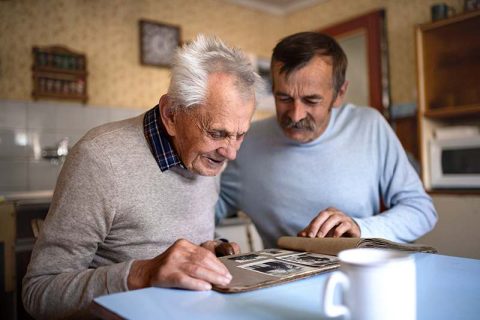August 6, 2025 by

Ask someone about their favorite sports memory, and chances are you’ll see their face light up. Maybe it was the thrill of being the star football player on the varsity team, the time they got to meet a legendary baseball hero, or their dad teaching them to shoot hoops in the driveway. If you’re using sports to connect with someone with dementia, these moments can feel surprisingly fresh—and can spark engagement in remarkable ways.
That’s why sporting nostalgia is becoming such a valuable part of dementia care. It connects people through what they still remember and love.
Why Sports Memories Stick
It’s a fascinating and hopeful truth: long-term memories often remain accessible to people living with dementia, even as recent ones fade. That means stories from decades past, like the joy of scoring a goal in a high school championship, can still feel vivid and energizing.
Sports-themed reminiscence therapy engages older adults living with dementia in conversations about favorite teams or unforgettable games, often leading to laughter, eye contact, and even animated debate, sparking parts of the brain that may lie quiet in day-to-day life.
What Makes It So Effective?
The key is emotional connection. Sports are a shared language. They also help create a “failure-free” environment. Unlike questions that rely on short-term memory, like what someone had for breakfast or who visited last week, sporting memories come from a deeper well. Participants often light up as they recall players’ names, old scores, or how they got to the stadium.
And because many of these moments are rooted in pride, belonging, or family tradition, revisiting them can help restore a sense of identity that dementia can sometimes cloud.
From Reminiscing to Reconnecting
But sporting memories don’t stop at conversation. Once people start re-engaging, many rediscover an interest in physical movement, too. Activities like golf putting, walking around a baseball field, or even just holding a football can draw people with dementia out of isolation.
And there’s another benefit: these kinds of interactions are multi-generational. Grandkids may not know who Babe Ruth was, but they know the thrill of a homerun. Sporting nostalgia bridges generations, turning one person’s past into a shared story for the whole family.
How You Can Implement Sporting Nostalgia at Home
This simple and powerful concept can be interwoven into a person’s daily life. Watching an old game together. Looking through team photos. Playing a highlight reel. Wearing a favorite cap. These small moments don’t cure dementia, but they absolutely support well-being, communication, and connection.
Incorporating a loved one’s passions into their day can make caregiving feel less like a series of tasks and more like a shared experience. And when it feels hard to manage alone, a professional caregiver trained in dementia support can help bring structure, engagement, and joy back into the routine.
We’re Here to Help
If someone in your life is living with dementia, know this: meaningful engagement is still possible. In-home support can provide the consistency, creativity, and care that help keep those moments alive.
With At Home Independent Living, we offer specialized dementia care that includes taking time to learn what matters to each person: their favorite team, their proudest memories, and the stories that still make them smile.
Call us at (315) 579-HOME (4663) to learn more about how we can help someone you love in Syracuse, Camillus, Clay, and throughout Central New York stay engaged, connected, and supported at home.
